11.I'm sorry
such for造句简单

such for造句简单1.It can also be set up as a filter, such for UU or Base64 coding.您还可以将OpenSSL设置成为一个过滤器,比如用于UU或Base64编码的过滤器。
2.You'll need such information to use as a baseline for measuring progress.你需要利用这些信息作为基准来衡量进展情况。
3.They are a hybrid, recognized as such for thousands of years, and can be seized at will by anyone, at any time, anywhere they are found.他们是数千年来人类公认的十恶不赦之徒,无论何时、在何地露面,人人均可缉拿之。
4.You are too young for such a responsible position.对于这样一个责任重大的职位,你太年轻了。
5.I feel the remark was inappropriate for such a serious issue.我觉得对如此严肃的问题来说,这评论是不恰当的。
6.Some may enjoy the liveliness of such a restaurant for a few hours a day or week.有人每天或每周都会来这样一个餐馆,享受几小时热烈氛围。
7.There is still some feeling in the art world that the market for such works may be declining.艺术界仍存在一种看法,认为这种作品的市场前景暗淡。
8.There may be a price to pay for such relentless activity, perhaps ill health or even divorce.这样没完没了的活动可能是要付出代价的,也许是不良健康状况甚至是离婚。
Unit 11.《I‘m sorry》(教案)-2022-2023学年英语五年级上册 湘少版(三起)

Unit 11.《I’m sorry》(教案)课程目标1.通过本课的学习,使学习者能够掌握表达道歉的基本句型和方法。
2.培养学习者的沟通技能和表达能力。
3.培养学习者积极向他人道歉的良好习惯。
教学重难点1.重点:掌握表示道歉的基本句型和方式。
2.难点:在具体情境中运用所学知识进行交流。
教学用具1.课件投影仪2.讲义手册3.录音机教学流程步骤一:导入1.教师和学生互相问候,建立良好的课堂氛围。
2.引入今天的主题——道歉。
步骤二:学习新词1.分享 PPT 中的图片,呈现新词汇:sorry 和 apologize。
2.通过图片和口型帮助学生正确地读出新词汇,并讲解其意思。
步骤三:学生自主实践1.分成小组,两人一组模拟具体场景。
其中一个人扮演“愤怒的人”,另一个人需要对“愤怒的人”道歉。
2.老师为学生提供必要的指导,确保学生能够运用所学知识进行交流。
步骤四:集体讨论1.分享学生的表演过程,让每个小组分享道歉的感受和经验。
2.鼓励学生分享看似小事却能带来大改变的道歉故事。
步骤五:评价1.老师对学生的表现进行评价,鼓励学生继续努力发扬道歉的良好习惯。
2.提醒学生在日常生活中要多多练习,提高自己的道歉能力。
课后作业完成教材相关的课后作业,通过自己的阅读和思考,加深对道歉这一主题的理解。
同时,鼓励学生在日常生活中积极地向他人道歉。
总结通过本堂课的学习,学生将掌握基本的道歉句型和方式,并在具体情境中进行了实践。
通过小组配对和集体讨论的方式,让同学们更好地理解道歉的必要性和良好的效果。
通过这样的教学形式能够培养学生沟通技能和表达能力,同时也能够让学生养成良好的道歉习惯。
中餐服务英语
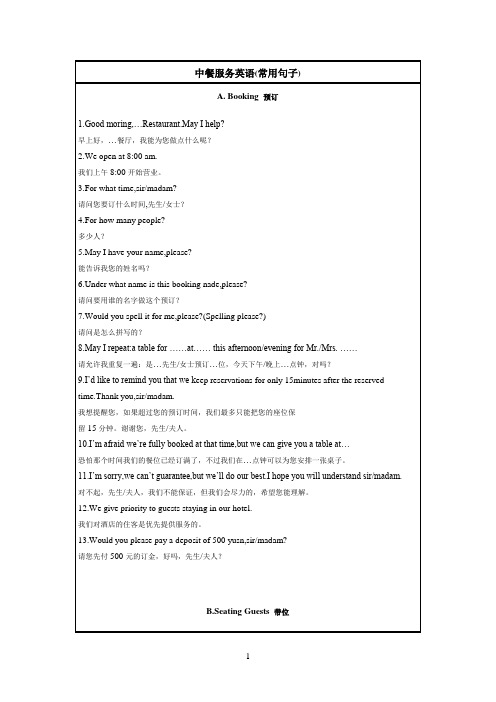
A. Booking预订
1.Good moring,…Restaurant.May I help?
早上好,…餐厅,我能为您做点什么呢?
2.We open at 8:00 am.
我们上午8:00开始营业。
3.For what time,sir/madam?
请问您要订什么时间,先生/女士?
为什么不试一下春卷呢,它很好吃。
17. Would you like to have steamed dumplings stuffed with shrimps?They’re juicy.They’re a traditional Cantonese snack.
您要蒸虾饺吗?它比较多汁的,是广东传统的点心之一。
我们对酒店的住客是优先提供服务的。
13.Would 500 yusn,sir/madam?
请您先付500元的订金,好吗,先生/夫人?
B.Seating Guests带位
1. Good morning, sir/madam.Table for2?
4.For how many people?
多少人?
5.May I have your name,please?
能告诉我您的姓名吗?
6.Under what name is this booking nade,please?
请问要用谁的名字做这个预订?
7.Would you spell it for me,please?(Spelling please?)
我想提醒您,如果超过您的预订时间,我们最多只能把您的座位保
留15分钟。谢谢您,先生/夫人。
10.I’m afraid we’re fully booked at that time,but we can give you a table at…
五年级上册英语单元测试-Unit 11 I’m sorry! 湘少版(含答案及听力书面材料)

Unit11 单元自测卷听力部分一、Listen and choose. 听音,选词填空。
( ) 1. It’s ________.A. lateB. thick ( ) 2. He feels ________.A. sadB. sorry ( ) 3. The dog is ________A. angryB. happy ( ) 4. The book is ________.A. dirtyB. new ( ) 5. They’re ________.A. readingB. swimming二、Listen and choose. 听音,选出正确的图片。
( ) 1. A. B.( ) 2. A. B.( ) 3. A. B.( ) 4. A. B.三、Listen and number. 听音,排序。
A. B.C. D.四、Listen and tick or cross. 听音,判断对“√”错“×”。
( ) 1. Peter feels sorry to sit on the desk.( ) 2. Miss Li is happy to see her students.( ) 3. Alice feels very hungry.( ) 4. Lingling likes cooking.( ) 5. Tim is sad. He lost his schoolbag.五、Listen and write. 听音,完成短文。
Mum gives Mary a (1) __________. Mary is (2) __________. She reads a story every evening. Mary’s brother likes (3) __________. He sings loudly every evening. Mary is very (4) __________. Mary tells the story to her (5) __________ and they’re happy.笔试部分一、Read and choose. 读一读,选出不同类的词。
sorry的用法和短语例句
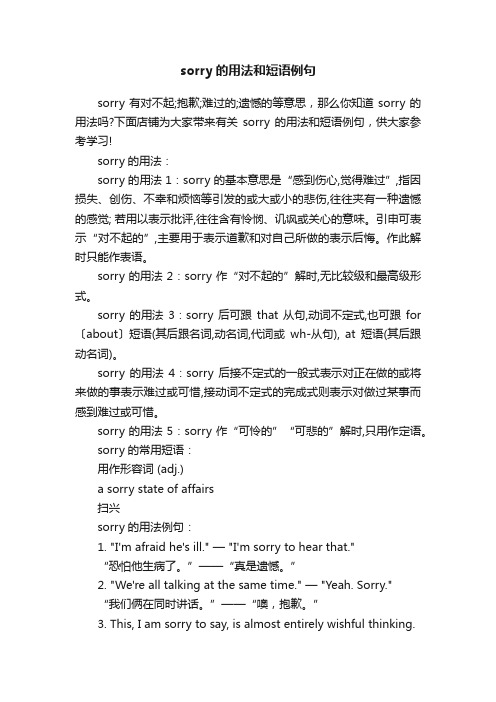
sorry的用法和短语例句sorry有对不起;抱歉;难过的;遗憾的等意思,那么你知道sorry的用法吗?下面店铺为大家带来有关sorry的用法和短语例句,供大家参考学习!sorry的用法:sorry的用法1:sorry的基本意思是“感到伤心,觉得难过”,指因损失、创伤、不幸和烦恼等引发的或大或小的悲伤,往往夹有一种遗憾的感觉; 若用以表示批评,往往含有怜悯、讥讽或关心的意味。
引申可表示“对不起的”,主要用于表示道歉和对自己所做的表示后悔。
作此解时只能作表语。
sorry的用法2:sorry作“对不起的”解时,无比较级和最高级形式。
sorry的用法3:sorry后可跟that从句,动词不定式,也可跟for 〔about〕短语(其后跟名词,动名词,代词或wh-从句), at短语(其后跟动名词)。
sorry的用法4:sorry后接不定式的一般式表示对正在做的或将来做的事表示难过或可惜,接动词不定式的完成式则表示对做过某事而感到难过或可惜。
sorry的用法5:sorry作“可怜的”“可悲的”解时,只用作定语。
sorry的常用短语:用作形容词 (adj.)a sorry state of affairs扫兴sorry的用法例句:1. "I'm afraid he's ill." — "I'm sorry to hear that."“恐怕他生病了。
”——“真是遗憾。
”2. "We're all talking at the same time." — "Yeah. Sorry."“我们俩在同时讲话。
”——“噢,抱歉。
”3. This, I am sorry to say, is almost entirely wishful thinking.我很遗憾,这几乎完全是一厢情愿的想法。
4. John, I'm sorry for Steve, but I think you've made the right decisions.约翰,我为史蒂夫感到难过,但是我认为你的决定是正确的。
五年级上册英语教案-Unit11I’msorry|湘少版(三起)

五年级上册英语教案Unit 11 I’m sorry|湘少版(三起)教学内容本单元主要围绕“表达歉意”这一主题展开,通过一系列的对话和活动,让学生掌握在日常交流中如何恰当地使用“I'm sorry”这一表达方式。
教学内容包括:学习表达歉意的不同场景和语境,如不小心碰到别人、忘记某事、迟到等;掌握相关词汇和句型,如“Excuse me”、“I'm sorry”、“That's all right”等;了解道歉的文化差异。
教学目标1. 知识目标:学生能够理解并正确使用“I'm sorry”及相关句型。
2. 能力目标:学生能够在不同的情境中灵活运用道歉的表达方式,提高日常交流能力。
教学难点1. 语境理解:学生需要理解在不同情境下如何恰当地使用道歉的表达。
2. 文化差异:介绍不同文化背景下道歉的方式和习惯,帮助学生理解并尊重文化多样性。
教具学具准备1. 教材:五年级上册英语教科书。
2. 多媒体:PPT课件,包含相关图片和音频。
3. 卡片:词汇卡片,用于复习和游戏环节。
4. 角色扮演道具:根据不同场景准备相应的道具,如书本、帽子等。
1. 导入:通过图片或小故事引入道歉的主题。
2. 新授:展示并解释新词汇和句型,通过例句和情景模拟帮助学生理解。
3. 练习:进行小组练习,鼓励学生用新学的词汇和句型进行对话。
4. 巩固:通过角色扮演或游戏等方式巩固所学内容。
板书设计中心:单元主题“I'm sorry”左侧:列出重点词汇和句型右侧:展示不同的道歉场景和语境作业设计1. 书面作业:完成教科书上的相关练习题。
2. 口头作业:与家长或朋友进行角色扮演,练习道歉的表达。
3. 扩展作业:调查不同文化背景下道歉的方式,准备简短的报告。
课后反思本节课后,教师应反思教学效果,包括学生对新知识的掌握程度、课堂活动的参与度以及教学目标的达成情况。
同时,针对学生的反馈和表现,调整教学方法,为下一节课做好准备。
五年级上册英语教案-Unit11I'msorry第二课时PartC、D湘少版三起

五年级上册英语教案Unit 11 I'm sorry 第二课时 Part C、D 湘少版三起教学内容本节课为《五年级上册英语》Unit 11 I'm sorry的第二课时,主要内容包括Part C和Part D两部分。
Part C部分通过对话形式,展示如何在日常生活中使用"I'm sorry"和"That's OK"等表达,强化学生对于道歉和接受道歉的交际用语的理解。
Part D部分则通过练习,巩固学生对本单元重点句型的掌握。
教学目标1. 知识目标:学生能够熟练运用"I'm sorry"和"That's OK"等表达进行日常交流。
2. 能力目标:提高学生的英语听说能力,增强他们在实际情境中运用英语进行交际的能力。
3. 情感目标:培养学生理解、接受和表达歉意的社交技能,增强他们的同理心和社交能力。
教学难点1. 道歉和接受道歉的恰当语境:学生需要理解在不同情境下如何恰当地使用道歉和接受道歉的表达。
2. 语音语调的准确性:确保学生能够准确模仿并使用正确的语音和语调。
教具学具准备1. 多媒体课件:用于展示对话和练习。
2. 实物道具:用于模拟真实场景,帮助学生更好地理解和运用所学知识。
3. 练习册:用于课堂练习和课后作业。
教学过程1. 导入:通过简单的日常交流,复习上一课时的内容,引出本节课的主题。
2. 新课展示:利用多媒体课件展示Part C部分的对话,引导学生理解并模仿。
3. 小组活动:学生分组练习对话,模拟真实场景。
4. 练习巩固:通过Part D部分的练习,巩固学生对重点句型的掌握。
板书设计1. 重点句型:在黑板上列出本节课的重点句型,如"I'm sorry"和"That's OK"。
2. 关键词汇:列出与道歉和接受道歉相关的关键词汇。
五年级上册英语教案-Unit11I'msorry

五年级上册英语教案Unit 11 I'm sorry.第三课时湘少版(三起)教学内容本课为湘少版(三起)五年级上册英语的第11单元,主题为"I'm sorry."。
教学内容主要包括日常生活中的礼貌用语,如“对不起”、“没关系”等表达方式,以及相关的句型和词汇。
通过本课的学习,学生能够理解和运用这些表达,以在日常交流中更加礼貌和得体。
教学目标1. 知识与技能目标:学生能够理解并正确使用“对不起”、“没关系”等礼貌用语,掌握相关句型和词汇。
2. 过程与方法目标:通过角色扮演、小组讨论等互动活动,提高学生的英语听说能力。
3. 情感态度价值观目标:培养学生礼貌交流的意识,增强他们的社交能力。
教学难点1. 正确运用"I'm sorry."和"It's okay./Never mind."进行情景对话。
2. 学生对于不同情境下礼貌用语的恰当运用。
教具学具准备1. 多媒体课件:包含本课的单词、句型和相关图片或视频。
2. 情景卡片:用于角色扮演活动,卡片上写有不同的情景描述。
3. 录音机:用于播放教材中的听力材料。
教学过程1. 课堂导入:通过一个简短的视频或故事引入主题,激发学生的兴趣。
2. 新知呈现:利用多媒体课件展示本课的单词和句型,并进行讲解和示范。
3. 小组活动:学生分组进行角色扮演,练习使用新学的礼貌用语。
4. 全班练习:教师引导全班进行对话练习,确保每个学生都有机会参与。
板书设计中心:单元主题 "I'm sorry."左侧:列出重点单词和短语。
右侧:展示主要句型和例句。
底部:布置相关的练习或作业。
作业设计1. 书面作业:完成教材中的相关练习题。
2. 口头作业:与家长或朋友进行角色扮演练习,使用本课学到的礼貌用语。
3. 扩展作业:鼓励学生观察日常生活中使用礼貌用语的情况,并记录下来。
最全面人教版七年级上册英语第七单元知识点归纳总结
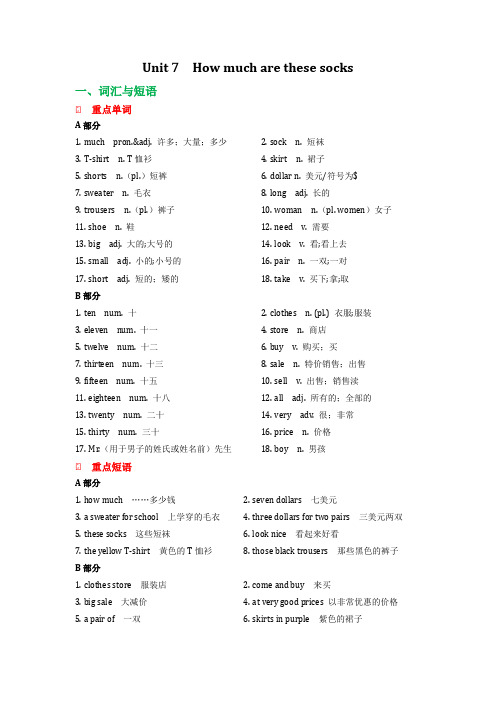
Unit 7 How much are these socks一、词汇与短语● 重点单词A部分1.much pron.&adj. 许多;大量;多少2.sock n. 短袜3.T-shirt n. T恤衫4.skirt n. 裙子5.shorts n.(pl.)短裤6.dollar n. 美元/符号为$7.sweater n. 毛衣8.long adj. 长的9.trousers n.(pl.)裤子10.woman n.(pl. women)女子11.shoe n. 鞋12.need v. 需要13.big adj. 大的;大号的14.look v. 看;看上去15.small adj. 小的;小号的16.pair n. 一双;一对17.short adj. 短的;矮的18.take v. 买下;拿;取B部分1.ten num. 十2.clothes n. (pl.) 衣服;服装3.eleven num. 十一4.store n. 商店5.twelve num. 十二6.buy v. 购买;买7.thirteen num. 十三8.sale n. 特价销售;出售9.fifteen num. 十五10.sell v. 出售;销售渎11.eighteen num. 十八12.all adj. 所有的;全部的13.twenty num. 二十14.very adv. 很;非常15.thirty num. 三十16.price n. 价格17.Mr.(用于男子的姓氏或姓名前)先生18.boy n. 男孩● 重点短语A部分1.how much ……多少钱2.seven dollars 七美元3.a sweater for school 上学穿的毛衣4.three dollars for two pairs 三美元两双5.these socks 这些短袜6.look nice 看起来好看7.the yellow T-shirt 黄色的T恤衫8.those black trousers 那些黑色的裤子B部分1.clothes store 服装店e and buy 来买3.big sale 大减价4.at very good prices 以非常优惠的价格5.a pair of 一双6.skirts in purple 紫色的裙子7.a clothes store 一家服装店8.at our great sale 在我们特价销售期间9.for girls 对于女孩子们● 重点句子A部分1.--How much are these socks? --Five dollars for three pairs.这些短袜多少钱? 五美元三双。
意愿的英语表达
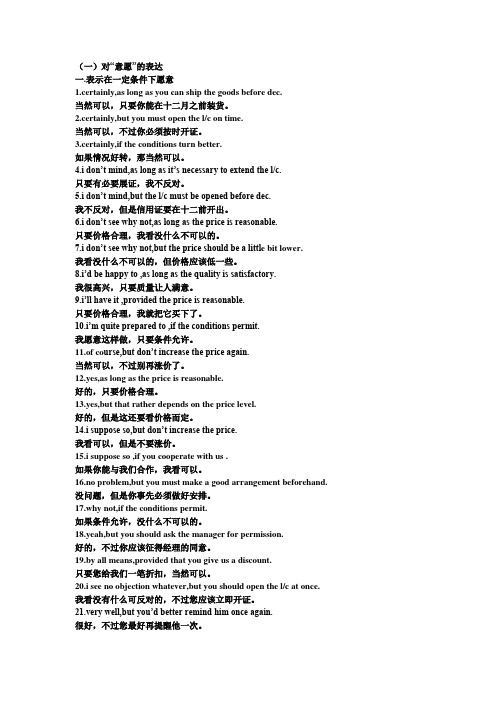
(一)对“意愿”的表达一.表示在一定条件下愿意1.certainly,as long as you can ship the goods before dec.当然可以,只要你能在十二月之前装货。
2.certainly,but you must open the l/c on time.当然可以,不过你必须按时开证。
3.certainly,if the conditions turn better.如果情况好转,那当然可以。
4.i don’t mind,as long as it’s necessary to extend the l/c.只要有必要展证,我不反对。
5.i don’t mind,but the l/c must be opened before dec.我不反对,但是信用证要在十二前开出。
6.i don’t see why not,as long as the price is reasonable.只要价格合理,我看没什么不可以的。
7.i don’t see why not,but the price should be a littl e bit lower.我看没什么不可以的,但价格应该低一些。
8.i’d be happy to ,as long as the quality is satisfactory.我很高兴,只要质量让人满意。
9.i’ll have it ,provided the price is reasonable.只要价格合理,我就把它买下了。
10.i’m quite prepared to ,if the conditions permit.我愿意这样做,只要条件允许。
11.of co urse,but don’t increase the price again.当然可以,不过别再涨价了。
12.yes,as long as the price is reasonable.好的,只要价格合理。
五年级英语上册Unit 11 I ’m sorry .教学设计

Unit 11 I ’m sorry .学校敖寨民族中心完小时间2017年11月16日科目英语年级五年级执教人余慧课题Unit 11 I ’m sorry.教材分析1、教材内容:湖南少年儿童出版社出版的小学五年级英语上册Unit 11 I ’m sorry .2、内容分析:本单元话题为感觉(feelings)旨在培养学生正确表达歉意、悲伤、喜悦等各种不同的感情,出现了许多有关感觉的单词和句型。
要求学生能用所学单词及句型介绍自己的感情,并能正确运用动词第三人称单数形式描述他人不同的感情。
同时教师还要教导学生养成良好的生活习惯,培养学生的文明意识。
在授课时,采用多种教学方法,从而激发学生学习英语的兴趣。
教学三维目标Knowledges and abilities1、The students can read and master the newwords:happy,sorry,angry,sad,shy,feel,proud,excited,noisy,louldy,make,noise.2、Have the students to learn and use the new sentences:---How do you feel?---I ’m proud/sorry/happy/...---I feel proud/sorry/happy/...4、Enable the students to learn and say the dialogue in PartA.5、Enable the students to communicate and act.Process and methods1、Warming up2、Making actions.3、Play GamesEmotion and values1、By learning this lesson.Improve the students’ability of communicating and acting.2、The teacher guides the students to develop a good sense of life and civilization.3、To train the students’ interest in English.教学重点难点Main point:1、Learn and use the new words and sentences.2、Learn how to describe How do you feel.Difficult point:1、To master the useful expressions and act the dialogue in groups.2、Correct use of the third person singular form of the verb.教法提示Reading. Listening. Talking. Making actions. Play Games. Group pairs 教学准备PPT and some cards课时安排The fist period(Part A B C)教学过程时间教学环节教师活动预设学生活动预设设计意图Step1 Warming up 1、Greetings:T: Hello! Everyone!Nice to meet you.……Greeting!师生对话可以营造英语会话氛围,进一步拉近师生间的距离。
湘少版,五年级上册英语,unit11 I'm sorry

Lead-in
• We can see with our eyes. • We can hear with our ears. • We can feel with our hearts.
我们用心感受。 我们用耳朵听。 我们用眼睛看。
Let’s
learn happy
How do you feel? happy I feel________.
How does she feel?
She feels ________. sad
How do they feel? They are_______. angry
How does he feel? He feels________. sorry
开心的,快乐的
They are happy.
他们很开心。
sad = unhappy
伤心的,难过的
I’m sad. 我很伤心。
angry
生气的,愤怒的
He feels angry.
他感觉很生气。
sorry
抱歉的,难过的
I’m sorry./I feel sorry.
我很抱歉。
excited
激动的,兴奋的
• noise 噪音 (名词) • noisy 嘈杂的,吵闹的(形容词) Please don’t make noise, it is too noisy. 请不要制造噪音,太吵闹了。
loudly 大声地(副词)
Please don’t talk loudly in the classroom. 请不要在教室里大声讲话。
let’s listen and say
1.What are the children doing? They are singing. 2.appy. 3.How do their neighbors feel? They are unhappy and angry. 4.Why the children and their neighbors have different feelings? Because the children made a lot of noise.
2020-2021学年外研版七年级英语下册单元测试附答案Module11
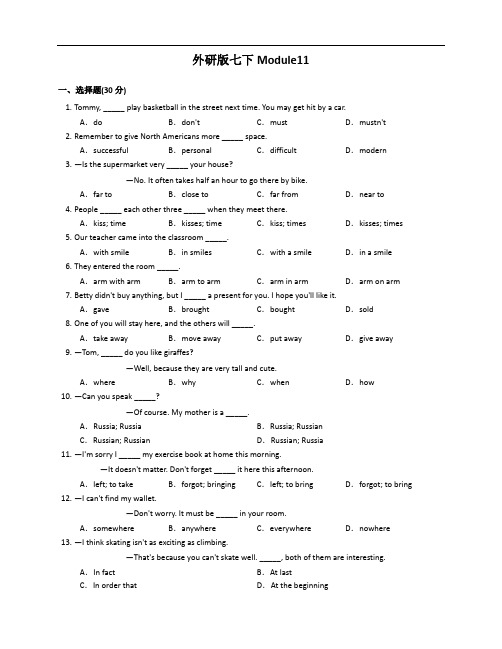
外研版七下Module11一、选择题(30分)1.Tommy, _____ play basketball in the street next time. You may get hit by a car.A.do B.don't C.must D.mustn't2.Remember to give North Americans more _____ space.A.successful B.personal C.difficult D.modern 3.—Is the supermarket very _____ your house?—No. It often takes half an hour to go there by bike.A.far to B.close to C.far from D.near to4.People _____ each other three _____ when they meet there.A.kiss; time B.kisses; time C.kiss; times D.kisses; times 5.Our teacher came into the classroom _____.A.with smile B.in smiles C.with a smile D.in a smile6.They entered the room _____.A.arm with arm B.arm to arm C.arm in arm D.arm on arm 7.Betty didn't buy anything, but I _____ a present for you. I hope you'll like it.A.gave B.brought C.bought D.sold8.One of you will stay here, and the others will _____.A.take away B.move away C.put away D.give away 9.—Tom, _____ do you like giraffes?—Well, because they are very tall and cute.A.where B.why C.when D.how 10.—Can you speak _____?—Of course. My mother is a _____.A.Russia; Russia B.Russia; RussianC.Russian; Russian D.Russian; Russia11.—I'm sorry I _____ my exercise book at home this morning.—It doesn't matter. Don't forget _____ it here this afternoon.A.left; to take B.forgot; bringing C.left; to bring D.forgot; to bring 12.—I can't find my wallet.—Don't worry. It must be _____ in your room.A.somewhere B.anywhere C.everywhere D.nowhere 13.—I think skating isn't as exciting as climbing.—That's because you can't skate well. _____, both of them are interesting.A.In fact B.At lastC.In order that D.At the beginning14.We Chinese often _____ and smile when we meet visitors.A.take photos B.get up C.shake hands D.hurry up 15.—Rachel, you'd better come to school on time tomorrow!—_____A.That sounds good. B.Sure, I will.C.Sorry, I don't want to. D.I don't know.二、填空题(10分)16.W do we do if we have something to tell others or if we want to learn something f theothers? Yes, we use our l that is, either spoken language or written language. But actually (实际上), there is another k of language and it is also very important. Do you know what it is? Yes, that is b language. Can you tell me something a body language? For example, if you agree with what I said just now, what do you do? And if you don't agree w what I said, what do you do? But s the same gesture means different things in different countries. For example, s in the world nodding head doesn't mean YES. So if you visit a foreign country, only speaking its language very well isn't e .(1) W(2) f(3) l(4) k(5) b(6) a(7) w(8) s(9) s(10) e三、完形填空(10分)17.People use body language to send messages to others. It is very because others canunderstand you easily when you use body language .When you are talking with others, you are not just using but also using gestures (手势). For example, waving one's hand is to say "Good-bye", shaking hands means welcome, and clapping hands congratulations (祝贺). Nodding the head means YES, but shaking the head means NO.Different countries have body languages. For example, when in , France and Arab countries, people kiss each other when they meet, men in China or Australia shake hands. People in Puerto Rico like touching each other, but people in Britain do not touch each other. People in Arab countries like close to one another when they are talking, but English people must keep a distance away when they are talking. It is very important the meanings of gestures and movements in the foreign country they will help you communicate with people and make you stay there much moreand comfortable.(1) A.helpful B.difficult C.easy D.useless(2) A.words B.ears C.handshake D.hands(3) A.to mean B.mean C.means D.meaning(4) A.the same B.a same C.the different D.different(5) A.Russia B.the Russia C.Russian D.a Russia(6) A.and B.or C.but D.so(7) A.stand B.stands C.sit D.standing(8) A.knowing B.know C.to know D.knows(9) A.when B.because C.so D.if(10) A.important B.sad C.interesting D.pleased四、翻译题(10分)18.我一点都不喜欢游泳。
Unit 11 I'm sorry. 导学案含解析
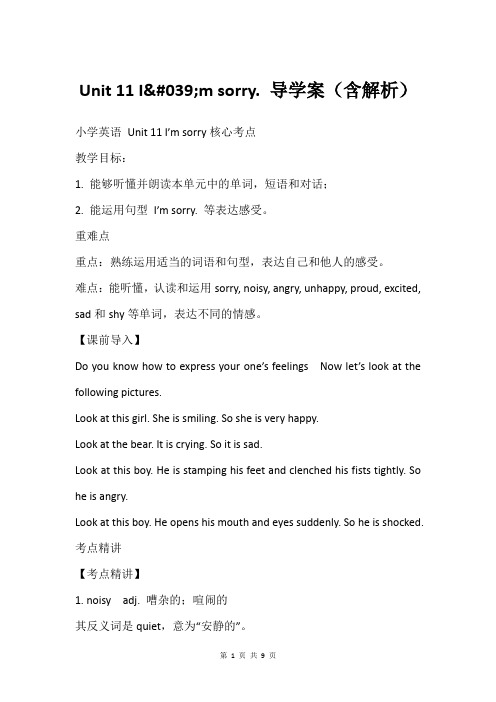
Unit 11 I'm sorry. 导学案(含解析)小学英语Unit 11 I’m sorry核心考点教学目标:1. 能够听懂并朗读本单元中的单词,短语和对话;2. 能运用句型I’m sorry. 等表达感受。
重难点重点:熟练运用适当的词语和句型,表达自己和他人的感受。
难点:能听懂,认读和运用sorry, noisy, angry, unhappy, proud, excited, sad和shy等单词,表达不同的情感。
【课前导入】Do you know how to express your one’s feelings Now let’s look at the following pictures.Look at this girl. She is smiling. So she is very happy.Look at the bear. It is crying. So it is sad.Look at this boy. He is stamping his feet and clenched his fists tightly. So he is angry.Look at this boy. He opens his mouth and eyes suddenly. So he is shocked.考点精讲【考点精讲】1. noisy adj. 嘈杂的;喧闹的其反义词是quiet,意为“安静的”。
noise是名词,意为“噪音”。
It’s very noisy in the street. 大街上很嘈杂。
There’s a lot of noise in the classroom. 教室里一片噪音。
The boy is very quiet. 这男孩很安静。
It’s ________________in the supermarket. There’re so many people. A. noise B. noisy C. quiet答案:B思路分析:is后接形容词,故排除A项,它是名词;根据“有一些人”可知“超市里很嘈杂。
YL unit11 I'm_sorry2014-12-10 15.17.37

shen zhi bo
happ y I feel happy.
angry
I am angry.
sad
I feel sad.
shy
I feel shy.
sorry
I feel sorry.
刘翔
姚明
杨威
excited
I feel excited.
proud
Pair Work:
学生两人一组,一人做 表情,一人描述。
She He She The The He boy girl is / feels is is / / feels feels is is / / feels feels shy. proud. excited. happy. sorry. sad. angry.
同学们,讲文明懂礼貌是 中华民族的优良传统,让我们 学会道歉,学会体谅他人,做 一个懂礼仪的文明快乐小天使!
1、新单词抄5+1,读5遍 2、预习A部分
Enjoy your life!
享受生活! Happy everyday!开心每一ຫໍສະໝຸດ !I feel proud.
根据心情的变化,用不同的语调来 读单词。
Quick response
老师说出表示各种情绪的单词, 学生快速变脸。
C Let’s Practise
Game: Listen, read and do
请两位同学上台,老师指定单词, 让台下的学生看并朗读出单词, 台上的两个学生听到之后,将单 词表演出来,比一比谁演得又快 又好。
福建师范大学大学英语(1)课后练习答案与课文译文
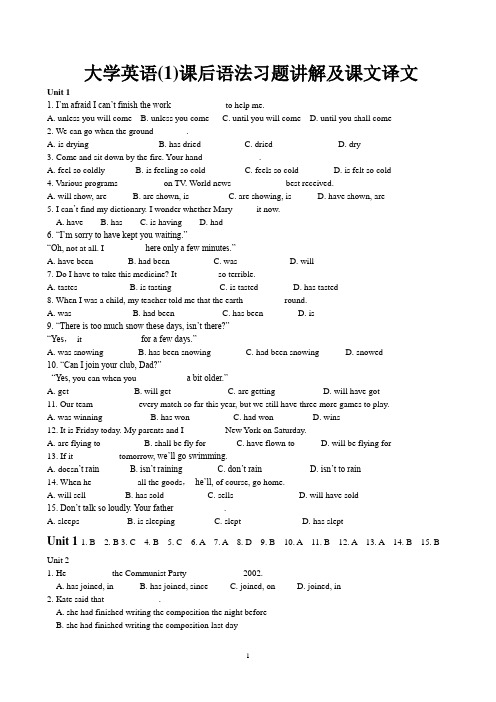
大学英语(1)课后语法习题讲解及课文译文Unit 11. I’m afraid I can’t finish the work____________ to help me.A. unless you will comeB. unless you comeC. until you will comeD. until you shall come2. We can go when the ground _______.A. is dryingB. has driedC. driedD. dry3. Come and sit down by the fire. Your hand_____________.A. feel so coldlyB. is feeling so coldC. feels so coldD. is felt so cold4. Various programs__________ on TV. World news____________ best received.A. will show, areB. are shown, isC. are showing, isD. have shown, are5. I can’t find my dictionary. I wonder whether Mary _____it now.A. haveB. hasC. is havingD. had6. “I’m sorry to have kept you waiting.”“Oh, not at all. I_________ here only a few minutes.”A. have beenB. had beenC. wasD. will7. Do I have to take this medicine? It_________ so terrible.A. tastesB. is tastingC. is tastedD. has tasted8. When I was a child, my teacher told me that the earth_________ round.A. wasB. had beenC. has beenD. is9. “There is too much snow these days, isn’t there?”“Yes,it_____________ for a few days.”A. was snowingB. has been snowingC. had been snowingD. snowed10. “Can I join your club, Dad?”“Yes, you can when you ___________a bit older.”A. getB. will getC. are gettingD. will have got11. Our team __________every match so far this year, but we still have three more games to play.A. was winningB. has wonC. had wonD. wins12. It is Friday today. My parents and I _________New York on Saturday.A. are flying toB. shall be fly forC. have flown toD. will be flying for13. If it__________ tomorrow, we’ll go swimming.A. doesn’t rainB. isn’t rainingC. don’t rainD. isn’t to rain14. When he__________ all the goods,he’ll, of course, go home.A. will sellB. has soldC. sellsD. will have sold15. Don’t talk so loudly. Your father ___________.A. sleepsB. is sleepingC. sleptD. has sleptUnit 1 1. B 2. B 3. C 4. B 5. C 6. A 7. A 8. D 9. B 10. A 11. B 12. A 13. A 14. B 15. BUnit 21. He__________ the Communist Party_____________2002.A. has joined, inB. has joined, sinceC. joined, onD. joined, in2. Kate said that ____________.A. she had finished writing the composition the night beforeB. she had finished writing the composition last dayC. I finished writing the composition on the last nightD. she finished writing the composition before the night3. My classmate_______________ a lot of good deeds for others.A. has been doneB. didC. was doingD. had done4. Jack_________ in the street when I_________ on him.A. walked…calledC. walked …was callingD.5. “Did you enjoy last night’s concert?”“Yes. Though the last piece _________rather poorly.”A. was playedB. playedC. was playingD. playing6. David ____________ himself while he __________the machine.A. hurte d… was fixingB. hurts… is fixingD. hurt … was fixing7. It__________ whether he will go on with his study at the university.A. hasn’t been decidedB. isn’t decidedC. hasn’t decidedD. do esn’t decide8. He said that he________ to the United States.A. had never beenB. had never goneC. was neverD. has never been9. This time last year I___________ my holiday in the countryside.A. haveB. was havingC. am havingD. have had10. “Where is Mary?”“She__________ to school.”A. will goB. has beenC. has goneD. went11. I’m sorry that I__________ you had been there already.A. won’t knowB. didn’t knowC. don’t knowD. h aven’t known12. It _________hard when I left the house.A. is rainingB. rainsC. was rainingD. will rain13. Tim ________a great number of different places in Australia.A. already has visitedB. has already visitedC. has visited alreadyD. has ever visited14. Up to now I_________ very successful.A. am notB. haven’t beenC. was notD. were not15. The wheat_________ cut three days ago.A. wereB. has beenC. hadD. wasUnit 2 1. D 2. A 3. B 4. D 5. A 6. D 7. A 8. A 9. B 10. C 11. B 12. C 13. B 14. B 15. DUnit 31. One ______________ if one breaks the law.A. will be punishedB. will punishC. is being punishedD. has been punished2. If you ________ quiet, I’ll tell you what happened.A. beB. are to beC. areD. will be3. Middle school boys _____________ not to smoke.A. always tellB. are told alwaysC. are always toldD. is always told4. If you study hard, you _____________ the examination.A. has passedB. are passingC. have passedD. will pass5. John does a lot of housework every evening, but now he _______ his schoolmates with their lessons.A. helpB. is helpingC. helpsD. has helped6. The song _______________ by children.A. is often sungB. was often sungC. singsD. has often sung7. By the end of 2020 China _____________ much stronger and richer.A. will becomeB. would becomeC. is becomingD. will have become8. It _______________ years since I last saw you.A. wasB. isC. will beD. has been9. The room _____________ often cleaned by the worker.A. hasB. will beC. wasD. is10. The railway ______________ in three years.A. is completeB. will completedC. has completedD. will be completed11. The Anti-Japanese War ________________ in 1937 and it_________eight years.12. ____________ you ____________ there before?A. Have, beenB. Have, goneC. Have, been toD. Have gone to13. Tom ___________ his lessons from seven to eight last night.A. was doingB. had doneC. were takenD. had been taken14. He ______________ thin. What’s happened to him?A. was gettingB. is gettingC. will gettingD. had been got15. I __________ my homework now.A. finishB. finishedC. have finishedD. had finishedUnit 3 1. A 2. C 3. C 4. D 5. B 6. A 7. D 8. D9. D 10. D 11. D 12. A13. A 14. B 15. CUnit 41. That factory _________ nearly 50 years ago.A. has been builtB. had builtC. was builtD. has built2. We all believe that computer ___________ smaller and smaller in the coming years.A. can be becomeB. will be gotC. will be changedD. can turn3. He ___________________ not to leave waste paper in public places any more.A. warnsB. warnedC. is warnedD. was warned4. Don’t worry. Everything will _____________ in time.A. be finishedB. finishC. finishedD. be finishing5. Such problems __________________ as soon as possible.A. have solvedB. have been solvingC. have to solveD. have to be solved6. Her application for the position _______________ by the boss.A. was refusedB. was refusingC. refusedD. is refusing7. The event _________ at the time last year.A. happensB. happenedC. is happenedD. was happened8. Much ____________ in the past few years.A. has doneB. didC. has been doneD. was done9. Because of the rainy day, the match __________.A. has been putting offB. has put offC. put offD. has been put off10. Working hours in the United States ____________ over the past 20 years.A. have increasedB. increasedC. were increasingD. have been increased11. Since computers were invented, it __________ that they are indispensable for scientific research.A. thoughtB. has been thoughtC. is thinkingD. had thought12. He was told that after he graduated he ____________ by a company.A. would be employedB. would get employedC. would be employingD. would employ13. The steps of progress in society ________ of as having happened in a short time.A. must not thinkB. must not be thoughtC. must thinkD. thought14. His wife told him that the kitchen __________ cleaned by the sweeper.A. was beingB. was gettingC. has beenD. got15. Owing to the snowstorm, the trip to the mountain _______.A. has been cancelingB. has canceledC. canceledD. has been canceledUnit 4 1. C 2. D 3. D 4. A 5. D 6. A 7. B 8. C 9. D 10. A 11. B 12. A 13. B 14. A15. D Unit 5课文翻译:Manners for InvitationsIn the United States, you can feel free to visit in people’s homes, share their holidays, enjoy their children and their lives without having to continue a lifetime relationship.Do not hesitate to accept invitations from Americans simply because you cannot invite them to your home in return.Most invitations are made by telephone or in person. Occasionally, for a formal party or dinner, an invitation requires an answer, either in writing or by telephone. If you later discover that you cannot attend, you should telephone the host or hostess and explain why you cannot come. You should do this before the party.You should arrive at the time you were invited for, or within five or ten minutes after that time. In the United States, whether for business or pleasure,people are very aware of the time and as a result are usually on time for business meeting and social activities.Although it is always welcome, it is not necessary to bring flowers or a gift when you are invited to lunch or dinner except on special occasions. If you wish to bring something, it should besmall and simple.Drinking habits vary widely among Americans. Some families never serve any drinks, others have them before dinner, or perhaps after dinner. You are more likely to be offered a cocktail before dinner than wine with the meal. If you do not get used to American cocktails, you can ask for something else. Moreover, drinks may be poured over ice. You will notice that Americans use more ice than those in other countries. If you prefer less ice, or no ice, you can just say no. Do not be surprised if you are offered milk, coffee, tea or even Coca-Cola with a meal.Social customs vary somewhat across the country, but in general, people tend to be friendlier and more informal as they invite you as a guest.应邀时的礼仪在美国,你到别人家里探访,可以无拘无束,也可以和他们共度假期,跟他们的孩子玩耍,和他们一起生活,用不着认为有义务同他们保持终生的友谊。
闹钟用英语怎么说

闹钟用英语怎么说闹钟是带有闹时装置的钟。
既能指示时间,又能按人们预定的时刻发出音响信号或其他信号。
那么你知道闹钟用英语怎么说吗?下面来学习一下吧。
闹钟英语说法1:clock闹钟英语说法2:alarm clock闹钟的相关短语:闹钟电视 Mezamashi TV ;MezamashiTV终极闹钟 Alarm Clock Xtreme ; Clock Cloud ; Definitive Alarm 闹钟软体 Atomic ; Convert ; ACAPsoft ; Alarm旅行闹钟 travel clock ; travelling clock ; travel alarm clock ; PTravelAlarm一个闹钟 an alarm clock闹钟机芯 alarm clock movement闹钟的英语例句:1. If an alarm gives you that feeling of security, then it'sworth carrying.如果带着闹钟让你感到心里踏实,那就值得携带。
2. They slept till the alarm bleeper woke them at four.他们一直睡到4点钟被寻呼机闹钟叫醒.3. Will somebody for God's sake shut that alarm off.看在上帝的份上,谁去关掉那个闹钟吧。
4. I set my alarm clock for 4.30.我把闹钟定在4点半。
5. Clock-radios blast away until you get up.收音机闹钟会一直响到你起床为止。
6. I set the alarm clock for 7 o'clock.我把闹钟定在7点钟闹响。
7. Do you know how to deactivate the alarm?你知道如何让闹钟不响吗?8. an alarm clock with a luminous dial夜光闹钟9. He tried to muffle the alarm clock by putting it under his pillow.他把闹钟塞在枕头底下,想减低声音。
